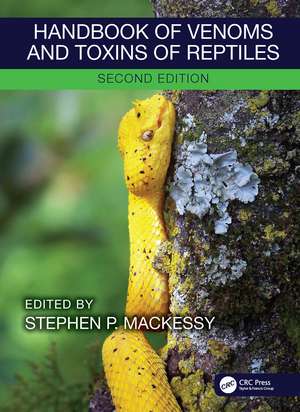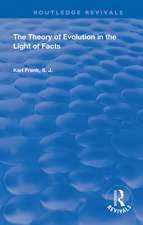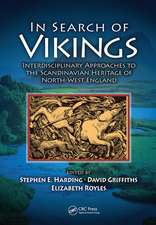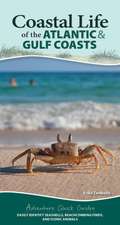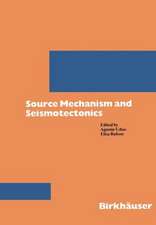Handbook of Venoms and Toxins of Reptiles
Editat de Stephen P. Mackessyen Limba Engleză Hardback – 25 mai 2021
This greatly expanded handbook offers a unique resource for biologists, biochemists, toxicologists, physicians, clinicians, and epidemiologists, as well as informed laypersons interested in the biology of venomous reptiles, the biochemistry and molecular biology of venoms, and the effects and treatment of human envenomation.
Preț: 1321.01 lei
Preț vechi: 1610.98 lei
-18% Nou
Puncte Express: 1982
Preț estimativ în valută:
252.78€ • 270.30$ • 210.76£
252.78€ • 270.30$ • 210.76£
Carte tipărită la comandă
Livrare economică 17 aprilie-01 mai
Preluare comenzi: 021 569.72.76
Specificații
ISBN-13: 9780367149741
ISBN-10: 0367149745
Pagini: 680
Ilustrații: 308
Dimensiuni: 210 x 280 x 37 mm
Greutate: 1.85 kg
Ediția:Nouă
Editura: CRC Press
Colecția CRC Press
ISBN-10: 0367149745
Pagini: 680
Ilustrații: 308
Dimensiuni: 210 x 280 x 37 mm
Greutate: 1.85 kg
Ediția:Nouă
Editura: CRC Press
Colecția CRC Press
Public țintă
ProfessionalCuprins
Preface
About the Editor
Contributors
Section I: Introduction and Technologies Used in Toxinology
1. Reptile venoms and toxins: Unlimited opportunities for basic and applied research – Stephen P. Mackessy
2. Present and future of snake venom proteomics profiling – Juan J. Calvete and Bruno Lomonte
3. Applications of genomics and related technologies for studying reptile venoms – Drew R. Schield, Blair W. Perry, Giulia I.M. Pasquesi, Richard W. Orton, Zachary L. Nikolakis, Aundrea K. Westfall, Todd A. Castoe
4. Snake venom gland transcriptomics – Cassandra M. Modahl and Rajeev Kungur Brahma
5. X-ray crystallography and structural studies of toxins – Vinícius Lucatelle da Silva, Ricardo Barros Mariutti, Mônika Aparecida Coronado, Raphael Josef Eberle, Fábio Rogério de Moraes and Raghuvir Krishnaswamy Arni
6. Envenomations and Treatment: Translating between the bench and the bedside – Nicklaus Brandehoff and Jordan Benjamin
7. Current assessment of the state of snake venom toxinological research with a view to the future – Sarah Natalie Cirilo Gimenes and Jay W. Fox
Section II: Venom Gland Structure, Systematics and Ecology
8. Reptile venom glands: Form, function, future, concepts and controversies – Scott A. Weinstein
9. Advances in venomous snake systematics, 2009-2019 - Wolfgang Wüster
10. Biochemical ecology of venomous snakes – Cara F. Smith and Stephen P. Mackessy
11. Resistance of native species to reptile venoms –– Danielle H. Drabeck
Section III: Reptile Venom Non-enzymatic Toxins
12. Three-finger toxins – Rajeev Kungur Brahma, Cassandra M. Modahl and
R. Manjunatha Kini
13. Myotoxin a, crotamine and defensin homologs in reptile venoms – Lucas C. Porta, Pedro Z. Amaral, Paulo Z. Amaral and Mirian A. F. Hayashi
14. Reptile venom disintegrins – Anthony J. Saviola and Juan J. Calvete
15. Reptile venom cysteine-rich secretory proteins – María Elisa Peichoto and Marcelo Larami Santoro
16. Bradykinin-potentiating and related peptides from reptile venoms - Daniel Carvalho Pimenta and Patrick Jack Spencer
17. Exendins and its related proteins – Michelle Khai Khun Yap and Nurhamimah Misuan
18. Reptile venom C-type-lectins – Kenneth J. Clemetson
19. Snake venom Kunitz-type inhibitors and cystatins – structure and function – Elda E. Sánchez, Emelyn Salazar, Montamas Suntravat and Francisco Torres
20. Small molecular constituents of snake venoms – Alejandro Villar-Briones and Steven D. Aird
21. Cobra venom factor: Structure, function, biology, research tool and drug lead – Carl-Wilhelm Vogel, Brian E. Hew and David C. Fritzinger
22. Snake toxins targeting diverse ion channels - Matan Geron and Avi Priel
Section IV: Reptile Venom Enzyme Toxins
23. Thrombin-like serine proteinases in reptile venoms – Stephen D. Swenson, Samantha Stack
and Francis S. Markland Jr.
24. Snake venom metalloproteinases – Charlotte A. Dawson, Stuart Ainsworth, Laura-Oana Albulescu and Nicholas R. Casewell
25. Snake venom matrix metalloproteinases (svMMPs): Alternative proteolytic enzymes in rear-fanged snake venoms – Inácio L. M. Junqueira-de-Azevedo and Juan David Bayona-Serrano
26. Snake venom phospholipase A2 toxins – Bruno Lomonte and Igor Križaj
27. Reptile venom L-amino acid oxidases – structure and function – Juliana P. Zuliania, Mauro V. Paloschi, Adriana S. Pontes, Charles N. Boeno, Jéssica A. Lopes, Sulamita S. Setubal, Fernando B. Zanchi and Andreimar M. Soares
28. Snake venom nucleases, nucleotidases, and phosphomonoesterases - Jüri Siigur and Ene Siigur
29. Reptile venom acetylcholinesterases - Mushtaq Ahmed, Wasim Ahmad, Nadia Mushtaq,
Rehmat Ali Khan and Maria Rosa Chitolina Schetinger
30. Inhibitors of reptile venom toxins – Ana F. Gómez Garay, Jorge J. Alfonso, Anderson M. Kayano, Juliana C. Sobrinho, Cleopatra A. S. Caldeira, Rafaela Diniz-Sousa, Fernando B. Zanchi, Juliana P. Zuliani, and Andreimar M. Soares
Section V: Global Approaches to Envenomations and Treatments
31. Snakebite envenomation as a neglected tropical disease: new impetus for confronting an old scourge – José María Gutiérrez
32. Current industrial production of snake antivenoms – Mariángela Vargas, Melvin Sánchez, Andrés Hernández, Aarón Gómez, Mauricio Arguedas, Andrés Sánchez, Laura Sánchez, Mauren Villalta, María Herrera and Álvaro Segura
33. Antivenom in the age of recombinant DNA technology – Andreas H. Laustsen
34. Epidemiology and treatment of reptile envenomations in the United States – Daniel E. Keyler and Nicklaus Brandehoff
35. Envenomations by reptiles in México – Edgar Neri-Castro, Melisa Bénard-Valle, Jorge López de León, Leslie Boyer and Alejandro Alagón
36. Snakebite envenomation in Central America: Epidemiology, pathophysiology and treatment – José María Gutiérrez
37. Snakebite in Southeast Asia: Envenomation and clinical management– Nget Hong Tan, Kae Yi Tan and Choo Hock Tan
38. Snake envenomation: Therapy and challenges in India – Ashis K. Mukherjee, Bhargab Kalita, Sumita Dutta, Aparup Patra, Chitta R. Maiti and Dileep Punde
39. Snakebite in Africa: Current situation and urgent needs – Jean-Philippe Chippaux
40. Approaches to snake envenomation in Southern Africa - James Pattinson, George Oosthuizen, Colin R. Tilbury and Darryl Wood
Section VI: Reptile Venoms – Production and as a Source of Therapeutics
41. Large-scale snake colonies for venom production: Considerations and challenges – Kristen L. Wiley and James R. Harrison
42. Toxins to drugs – biochemistry and pharmacology – Zoltan Takacs
About the Editor
Contributors
Section I: Introduction and Technologies Used in Toxinology
1. Reptile venoms and toxins: Unlimited opportunities for basic and applied research – Stephen P. Mackessy
2. Present and future of snake venom proteomics profiling – Juan J. Calvete and Bruno Lomonte
3. Applications of genomics and related technologies for studying reptile venoms – Drew R. Schield, Blair W. Perry, Giulia I.M. Pasquesi, Richard W. Orton, Zachary L. Nikolakis, Aundrea K. Westfall, Todd A. Castoe
4. Snake venom gland transcriptomics – Cassandra M. Modahl and Rajeev Kungur Brahma
5. X-ray crystallography and structural studies of toxins – Vinícius Lucatelle da Silva, Ricardo Barros Mariutti, Mônika Aparecida Coronado, Raphael Josef Eberle, Fábio Rogério de Moraes and Raghuvir Krishnaswamy Arni
6. Envenomations and Treatment: Translating between the bench and the bedside – Nicklaus Brandehoff and Jordan Benjamin
7. Current assessment of the state of snake venom toxinological research with a view to the future – Sarah Natalie Cirilo Gimenes and Jay W. Fox
Section II: Venom Gland Structure, Systematics and Ecology
8. Reptile venom glands: Form, function, future, concepts and controversies – Scott A. Weinstein
9. Advances in venomous snake systematics, 2009-2019 - Wolfgang Wüster
10. Biochemical ecology of venomous snakes – Cara F. Smith and Stephen P. Mackessy
11. Resistance of native species to reptile venoms –– Danielle H. Drabeck
Section III: Reptile Venom Non-enzymatic Toxins
12. Three-finger toxins – Rajeev Kungur Brahma, Cassandra M. Modahl and
R. Manjunatha Kini
13. Myotoxin a, crotamine and defensin homologs in reptile venoms – Lucas C. Porta, Pedro Z. Amaral, Paulo Z. Amaral and Mirian A. F. Hayashi
14. Reptile venom disintegrins – Anthony J. Saviola and Juan J. Calvete
15. Reptile venom cysteine-rich secretory proteins – María Elisa Peichoto and Marcelo Larami Santoro
16. Bradykinin-potentiating and related peptides from reptile venoms - Daniel Carvalho Pimenta and Patrick Jack Spencer
17. Exendins and its related proteins – Michelle Khai Khun Yap and Nurhamimah Misuan
18. Reptile venom C-type-lectins – Kenneth J. Clemetson
19. Snake venom Kunitz-type inhibitors and cystatins – structure and function – Elda E. Sánchez, Emelyn Salazar, Montamas Suntravat and Francisco Torres
20. Small molecular constituents of snake venoms – Alejandro Villar-Briones and Steven D. Aird
21. Cobra venom factor: Structure, function, biology, research tool and drug lead – Carl-Wilhelm Vogel, Brian E. Hew and David C. Fritzinger
22. Snake toxins targeting diverse ion channels - Matan Geron and Avi Priel
Section IV: Reptile Venom Enzyme Toxins
23. Thrombin-like serine proteinases in reptile venoms – Stephen D. Swenson, Samantha Stack
and Francis S. Markland Jr.
24. Snake venom metalloproteinases – Charlotte A. Dawson, Stuart Ainsworth, Laura-Oana Albulescu and Nicholas R. Casewell
25. Snake venom matrix metalloproteinases (svMMPs): Alternative proteolytic enzymes in rear-fanged snake venoms – Inácio L. M. Junqueira-de-Azevedo and Juan David Bayona-Serrano
26. Snake venom phospholipase A2 toxins – Bruno Lomonte and Igor Križaj
27. Reptile venom L-amino acid oxidases – structure and function – Juliana P. Zuliania, Mauro V. Paloschi, Adriana S. Pontes, Charles N. Boeno, Jéssica A. Lopes, Sulamita S. Setubal, Fernando B. Zanchi and Andreimar M. Soares
28. Snake venom nucleases, nucleotidases, and phosphomonoesterases - Jüri Siigur and Ene Siigur
29. Reptile venom acetylcholinesterases - Mushtaq Ahmed, Wasim Ahmad, Nadia Mushtaq,
Rehmat Ali Khan and Maria Rosa Chitolina Schetinger
30. Inhibitors of reptile venom toxins – Ana F. Gómez Garay, Jorge J. Alfonso, Anderson M. Kayano, Juliana C. Sobrinho, Cleopatra A. S. Caldeira, Rafaela Diniz-Sousa, Fernando B. Zanchi, Juliana P. Zuliani, and Andreimar M. Soares
Section V: Global Approaches to Envenomations and Treatments
31. Snakebite envenomation as a neglected tropical disease: new impetus for confronting an old scourge – José María Gutiérrez
32. Current industrial production of snake antivenoms – Mariángela Vargas, Melvin Sánchez, Andrés Hernández, Aarón Gómez, Mauricio Arguedas, Andrés Sánchez, Laura Sánchez, Mauren Villalta, María Herrera and Álvaro Segura
33. Antivenom in the age of recombinant DNA technology – Andreas H. Laustsen
34. Epidemiology and treatment of reptile envenomations in the United States – Daniel E. Keyler and Nicklaus Brandehoff
35. Envenomations by reptiles in México – Edgar Neri-Castro, Melisa Bénard-Valle, Jorge López de León, Leslie Boyer and Alejandro Alagón
36. Snakebite envenomation in Central America: Epidemiology, pathophysiology and treatment – José María Gutiérrez
37. Snakebite in Southeast Asia: Envenomation and clinical management– Nget Hong Tan, Kae Yi Tan and Choo Hock Tan
38. Snake envenomation: Therapy and challenges in India – Ashis K. Mukherjee, Bhargab Kalita, Sumita Dutta, Aparup Patra, Chitta R. Maiti and Dileep Punde
39. Snakebite in Africa: Current situation and urgent needs – Jean-Philippe Chippaux
40. Approaches to snake envenomation in Southern Africa - James Pattinson, George Oosthuizen, Colin R. Tilbury and Darryl Wood
Section VI: Reptile Venoms – Production and as a Source of Therapeutics
41. Large-scale snake colonies for venom production: Considerations and challenges – Kristen L. Wiley and James R. Harrison
42. Toxins to drugs – biochemistry and pharmacology – Zoltan Takacs
Notă biografică
Stephen P. Mackessy is Professor of Biology in the School of Biological Sciences at the University of Northern Colorado (UNC). His research broadly encompasses the biology of venomous snakes and the biochemistry of snake venoms, and he has published over one hundred scientific papers, book chapters, and natural history notes.
Descriere
The most comprehensive review of reptile venoms on the market, this completely updated and greatly expanded handbook offers a "one-stop shop" to all those interested in the biology of venomous reptiles, the biochemistry and molecular biology of venoms, and the effects and treatment of human envenomation.
